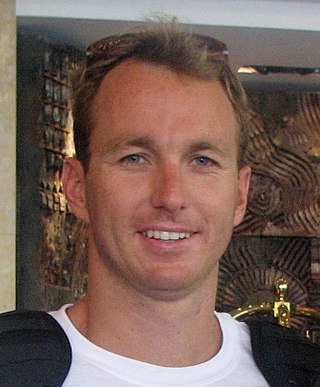
The men's 200 metre backstroke event at the 2004 Olympic Games was contested at the Olympic Aquatic Centre of the Athens Olympic Sports Complex in Athens, Greece on August 18 and 19. There were 36 competitors from 30 nations. Each nation had been limited to two swimmers in the event since 1984.
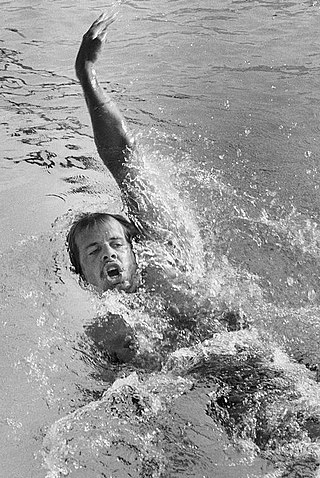
The men's 200 metre backstroke event for the 1976 Summer Olympics was held in Montreal. The event took place on 24 July. There were 33 competitors from 23 nations, with each nation having up to 3 swimmers. The event was won by John Naber of the United States in world-record time; he was the first person to swim the event in under 2 minutes (1:59.19). It was Naber's fifth medal of the Games: completing a double in the backstroke events as well as golds in the medley relay and the 4×200 free relay, along with a silver in the 200 free. It was the second American victory and second American medal sweep in the men's 200 metre backstroke, after 1968; of the 12 medals from 1968 through 1976, 10 were won by Americans and the other two by Roland Matthes. Peter Rocca (silver) and Dan Harrigan (bronze) were the other two Americans, along with Naber, to reach the podium in 1976. The rules changed in 1984 to limit nations to two swimmers each, preventing further sweeps.

The men's 200 metre freestyle event at the 1976 Summer Olympics took place on July 19 at the Olympic Pool, Montreal. There were 55 competitors from 33 nations, with each nation having up to three swimmers. The medals were swept the United States, the only time there has been a medal sweep in the men's 200 metre freestyle. Bruce Furniss took gold, John Naber silver, and Jim Montgomery bronze. It was the second consecutive and third overall victory by an American swimmer.

The men's 200 metre freestyle event at the 1992 Summer Olympics took place on 26 July at the Piscines Bernat Picornell in Barcelona, Spain. There were 55 competitors from 39 nations, with each nation having up to two swimmers. The event was won by Yevgeny Sadovyi of the Unified Team; it was the first victory in the men's 200 metre freestyle by an athlete from the former Soviet Union since Moscow 1980. Anders Holmertz of Sweden repeated as the silver medalist, becoming the first man to win multiple medals in the event. Antti Kasvio earned a bronze medal in Finland's debut in the event.
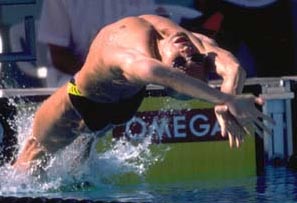
The men's 200 metre backstroke event at the 1992 Summer Olympics took place on 28 July at the Piscines Bernat Picornell in Barcelona, Spain. There were 44 competitors from 34 nations. Each nation had been limited to two swimmers in the event since 1984. The event was won by Martín López-Zubero of Spain. Vladimir Selkov of the Unified Team took silver, while Stefano Battistelli of Italy earned bronze. It was the first medal in the men's 200 metre backstroke for each nation.

The men's 200 metre freestyle event at the 1996 Summer Olympics took place on 20 July at the Georgia Tech Aquatic Center in Atlanta, United States. There were 43 competitors from 36 nations, with each nation having up to two swimmers. The event was won by Danyon Loader of New Zealand, the nation's first medal in the men's 200 metre freestyle. Brazil also received its first medal in the event, with Gustavo Borges taking silver. Bronze went to Australia's Daniel Kowalski.

The men's 200 metre backstroke event at the 1996 Summer Olympics took place on 26 July at the Georgia Tech Campus Recreation Center in Atlanta, United States. There were 39 competitors from 33 nations. Each nation had been limited to two swimmers in the event since 1984. The event was won by Brad Bridgewater of the United States, with his countryman Tripp Schwenk taking silver. It was the first time since 1980 that one nation had two swimmers on the podium in the event. Bridgewater's victory was the United States' first in the event since 1984 and fourth overall. Italy earned its second consecutive bronze medal in the men's 200 metre backstroke, with Emanuele Merisi taking the honours this time.

The men's 200 metre backstroke event at the 2000 Summer Olympics took place on 20–21 September at the Sydney Olympic Park Aquatic Centre in Sydney, Australia. There were 45 competitors from 38 nations. Each nation had been limited to two swimmers in the event since 1984. The event was won by Lenny Krayzelburg of the United States, with his countryman Aaron Peirsol taking silver. It was the second consecutive Games that Americans had finished one-two in the event. Bronze went to Matt Welsh of Australia, the nation's first medal in the event since 1980.

The men's 200 metre freestyle event at the 1984 Summer Olympics was held in the McDonald's Olympic Swim Stadium in Los Angeles, California, on July 29, 1984. There were 56 competitors from 36 nations, with each nation having up to two swimmers. The event was won by Michael Gross of West Germany, the nation's first victory in the event. His countryman Thomas Fahrner took bronze. Americans placed second and fourth, with Mike Heath earning silver and Jeff Float in fourth place.
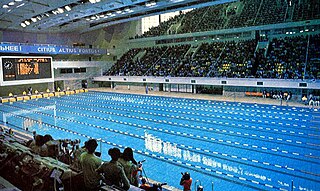
The men's 200 metre backstroke event at the 1980 Summer Olympics was held on 26 July at the Swimming Pool at the Olimpiysky Sports Complex. There were 25 competitors from 16 nations, with each nation having up to three swimmers. The event was won by Sándor Wladár of Hungary, with his countryman Zoltán Verrasztó taking second. Mark Kerry of Australia earned bronze. They were the first medals in the event for both nations. The United States' four-Games podium streak ended due to the American-led boycott.

The men's 200 metre freestyle event at the 1980 Summer Olympics was held on 21 July at the Swimming Pool at the Olimpiysky Sports Complex. There were 42 competitors from 24 nations, with each nation having up to three swimmers. The event was won by Sergey Koplyakov of the Soviet Union, with his countryman Andrey Krylov finishing second. The medals were the first for the Soviet Union in the men's 200 metre freestyle. Graeme Brewer of Australia won that nation's first medal in the event since 1968 with his bronze.

The men's 200 metre backstroke event at the 2008 Olympic Games took place on 13–15 August at the Beijing National Aquatics Center in Beijing, China. There were 40 competitors from 31 nations.
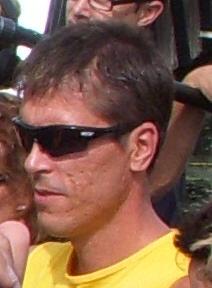
The men's 200 metre freestyle event at the 1988 Summer Olympics took place on 18–19 September at the Olympic Park Swimming Pool in Seoul, South Korea. There were 63 competitors from 41 nations, with each nation having up to two swimmers.

The men's 100 metre freestyle event at the 1952 Summer Olympics took place between 26 and 27 July at the Helsinki Swimming Stadium. There were 61 competitors from 33 nations. Nations had been limited to three swimmers each since the 1924 Games. The event was won by Clarke Scholes of the United States, the nation's second consecutive and seventh overall victory in the men's 100 metre freestyle. Japan, absent from the 1948 Games after World War II, returned to the podium in the event with Hiroshi Suzuki's silver. Göran Larsson earned Sweden's first medal in the event since 1908 with his bronze.
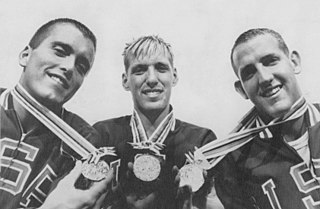
The men's 200 metre backstroke event at the 1964 Summer Olympics took place between October 11 and 13. There were 34 competitors from 21 nations, with each nation having up to 3 swimmers. The medals were swept by the United States, with Jed Graef, Gary Dilley, and Bob Bennett taking gold, silver, and bronze respectively.
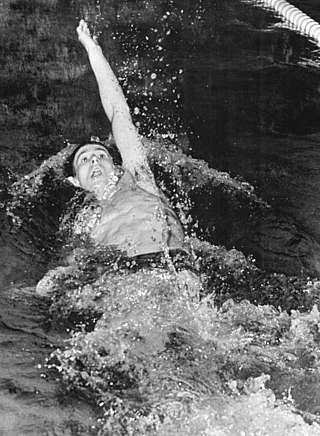
The men's 200 metre backstroke event at the 1968 Summer Olympics took place on 25 October at the Alberca Olímpica Francisco Márquez. There were 30 competitors from 21 nations, with each nation having up to three swimmers. The event was won by Roland Matthes of East Germany, the second gold medal for a German swimmer after Ernst Hoppenberg won in 1900. Matthes completed the backstroke double in the first Games both events were held, with Olympic record times in both. The United States, which had swept the podium in 1964, finished in the next three places behind Matthes: Mitch Ivey took silver, Jack Horsley bronze, and Gary Hall Sr. 4th.
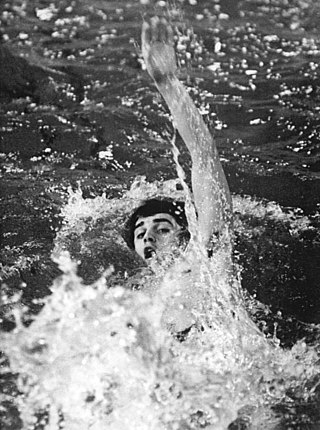
The men's 200 metre backstroke event at the 1972 Summer Olympics took place on September 2 at the Olympia Schwimmhalle. There were 36 competitors from 23 nations, with each nation having up to 3 swimmers. The podium was very similar to the previous Games in 1968, with Roland Matthes of East Germany winning gold and the United States taking the other two medals, including one going to Mitch Ivey. Matthes and Ivey were the first two men to earn multiple medals in the event, with Matthes the first to win back-to-back championships and Ivey adding his 1972 bronze to his 1968 silver. Mike Stamm was the silver medalist in Munich. Matthes also defended his 1968 100 metre backstroke title, giving him the backstroke double a second time.
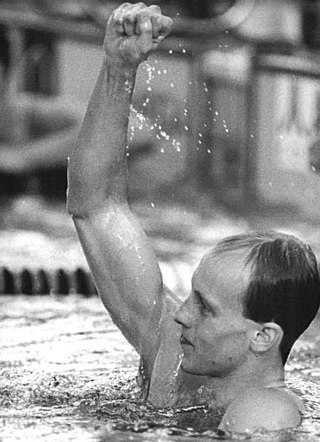
The men's 200 metre backstroke event at the 1988 Summer Olympics took place on 22 September at the Jamsil Indoor Swimming Pool in Seoul, South Korea. There were 44 competitors from 32 nations. Each nation had been limited to two swimmers in the event since 1984. The event was won by Igor Polyansky of the Soviet Union. Frank Baltrusch of East Germany took silver, while Paul Kingsman of New Zealand earned bronze. The medals were the first in the men's 200 metre backstroke for the Soviet Union and New Zealand; East Germany had not medaled in the event since Roland Matthes won gold in 1968 and 1972. For the first time, the United States competed and did not earn at least silver.

The men's 200 metre backstroke event at the 2012 Summer Olympics took place on 1–2 August at the London Aquatics Centre in London, United Kingdom. There were 35 competitors from 27 nations.

The men's 200 metre backstroke event at the 2016 Summer Olympics took place on 10–11 August at the Olympic Aquatics Stadium. There were 26 competitors from 19 nations.




















